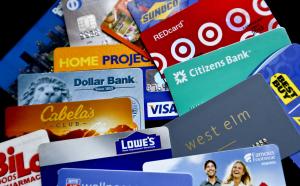3 questions to ask before getting a new credit card
Credit card issuers are pulling out all the stops lately to capitalize on what's expected to be a huge spending boom as vaccinated Americans emerge from their pandemic cocoons.
For example, Wells Fargo debuted a new credit card this week with unlimited 2% cash rewards and no annual fee — plus a $200 bonus — while Citi also introduced a new no-fee card with 5% cash back on up to $500 a month in spending.
"It’s a great time to apply for a new card," said Ted Rossman, senior industry analyst at CreditCards.com. "After a very cautious 15 months, credit card issuers are feeling better about risk and want to capture the rebound in Americans’ spending."
Last week, Chase increased its sign-on bonus on its Sapphire Preferred card to 100,000 points, after increasing incentives last month for the cards it shares with Southwest and IHG.
But before diving in on the first credit card offer you see, ask yourself these five questions.
Do you carry a balance?
Be honest with yourself. If you tend to carry a credit card balance, prioritize the interest rate over the rewards, Rossman said.
For instance, you can get 0% balance transfer and introductory APR offers as long as 20 months on some cards. Others offer 12 to 18 months.
"Most of the best 0% cards don’t offer rewards, but that’s okay. If you have credit card debt, focus on paying it down at the lowest possible interest rate," Rossman said. "It doesn’t make sense to chase a few percentage points in rewards if you’re paying 15-20% in interest."
How do you spend your money?
If you don't carry balances and pay your cards off in full every month, it's important to think where you spend your money. That's because different cards reward more — or less — for different spending categories.
Also, do you spend enough to carry a card that has an annual fee? It's important to make that calculation by estimating how many rewards annually you could build up with your regular spending plus weighing the value of other features the card provides.
"If you’re willing to put in more work, you could juggle different cards that lean into different categories, and you could also pursue travel rewards, which tend to be more complicated but also potentially more lucrative than cash back," Rossman said.
What's required of you for a bonus?
"It is really important for people to understand what the [minimum] spends are with these sign-up bonuses," Matt Schulz, chief credit analyst at LendingTree, told Cashay. "And also whether they can handle it."
For instance, both the Chase Sapphire Preferred card and the Capital One Venture card offer a sign-up bonus of 100,000 rewards. But the requirements to get the bonus are very different.
For the Chase Sapphire Preferred card, you must spend $4,000 on purchases in the first 3 months to get the bonus. But for the Capital One Venture card, you earn half the bonus after spending $3,000 within the first three months. You get the second half after spending $20,000 within the first 12 months.
"Those spending minimums are very, very different," Schulz said. "The last thing you want is to be blindsided by the sign-up bonus and not understand what is being asked of you."





